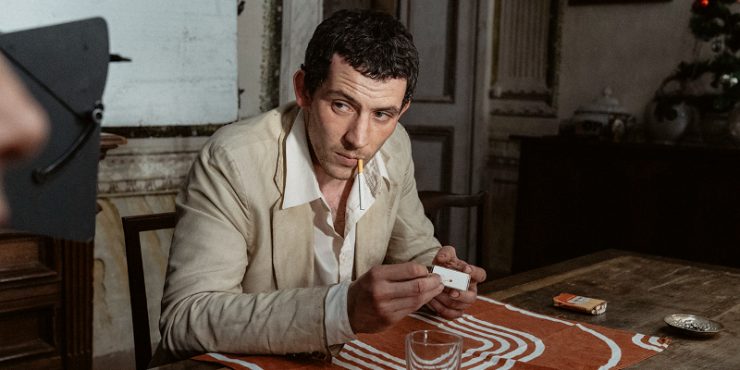Alice Rohrwacher is creating in a league of her own. Her narratives possess a deceptive formlessness that requires an amount of commitment from the audience. If you don’t lean into the romantic idiosyncrasies of her stories than the whole exercise can feel like a chore. I find her work remarkable. Her unique sensibility – she seems to disavow the classic hero’s journey – is unpredictable and exciting, filled with sequences that are imbued with her singular vision, unlike anyone else’s. Her latest film, La chimera, is another in that tradition. The film stars English actor Josh O’Connor, whose large, gangly frame stands out among the rural Italian setting. Perpetually dressed in a thin, rumpled suit of dusted white, O’Connor walks throughout La chimera like a kind of spiritual figure – which, in a way, he is.
O’Connor plays Arthur, an archaeologist with a supernatural skill for finding underground tombs that hold the centuries-old treasures of Etruscan society. This skill comes in handy when assisting a syndicate of grave robbers who use Arthur to raid the tombs and sell the artifacts for cold hard cash. At the beginning of La chimera, Arthur has just been released from prison and is begrudgingly returning to his old stomping grounds. Pirro (Vincenzo Nemolato) tries to meet him at the train station, to convince him to come back to the gang and start the operation over again. Arthur is much more interested in visiting Flora (Isabella Rosellini), a wheelchair-bound singing teacher whose daughter, Beniamina, is the love of Arthur’s life. Flora lives in a crumbling old house, but she refuses to leave, in case Beniamina returns – an unlikely event that Arthur is holding out for as well.
Flora has a live-in student named Italia (Carol Duarte). Italia is tone-deaf and is closer to a servant than a singing prospect, and of course, she has her own secrets that will be revealed. Italia takes an interest in Arthur, the handsome but unkempt visitor, whose taciturn expression hides an obvious pain: the loss of a great love. It doesn’t take long until the gang of thieves convince Arthur to reenter the fold, and they are soon gallivanting beneath the earth of urban Italian cities, only to discover the priceless riches of the past. The gang’s motive is purely monetary – the more artifacts they find, the more money they can collect from a mysterious dealer named Spartaco. For Arthur, something about this search feels more substantial. He’s not just looking for the next stash of Etruscan gold, but something much more meaningful.
And what is Arthur really searching for? This is the great mystery at the center of La chimera. His moody, mercurial nature keeps everyone at arm’s length – including the audience. Rohrwacher is clever in the ways she reveals Arthur’s motivations, his willingness to attach himself to such unseemly characters, and the way in which he allows his supernatural gifts to be exploited by thieves. His relationship with Italia is endearing and futile in equal measure, as the specter of Beniamia looms large over every scene. The film’s script, undisciplined in its structure but ingenious in its creativity, does a good job of charming you with its criminal hijinks while allowing you to explore the distinct nature of Arthur’s grief. La chimera is not a film that relies on narrative twists, but it will surprise you with how it unfolds, frequently misdirecting in the best ways.
Rohrwacher’s films – 2018’s Happy as Lazarro, the 2022 short film Le pupille, to name a couple – are highly rewarding to those who accept the unorthodox nature of her filmmaking style. Her visual aesthetic evokes the grit of neorealism, while her stories often expand in to a form of magical realism, and her films often feature a strong contrast between the rustic and the fantastic. The effect is that an audience is never quite balanced against what the reality of her films are supposed to be. La chimera feels like the pinnacle of everything she’s done so far, a tremendous thesis statement on her unrivaled imagination and thematic gifts. The way she finds emotional grace notes within these unorthodox tales still surprises those familiar with her filmography. The use of humor, surrealism, and most of all, the use of music – both diegetic and otherwise – showcase a filmmaker whose talent is only strengthened as the scale increases.
I will not spoil the film’s conclusion, but I will comment that the simplicity of its execution only adds to its incredible impact, a long-game gamble that truly gratifies any audience member holding out for the catharsis. At its heart, Rohrwacher’s story here is about coming to terms with loss, and while grief has become a well-worn theme in many an adult drama these days, La chimera manages to tackle it in a way that is unlike anything I’ve ever seen. It makes it clear that Rohrwacher is an artist who views the world differently than most of us. A lot of directors like that may struggle with making that vision palatable to the audience, but La chimera is proof that our best artists can translate the seemingly untranslatable. The movie got a negligible qualifying release last year, which is why it made my best of the year list. But now it’s more formally available for all to see. This is the definition of a can’t-miss movie.
Written and Directed by Alice Rohrwacher










